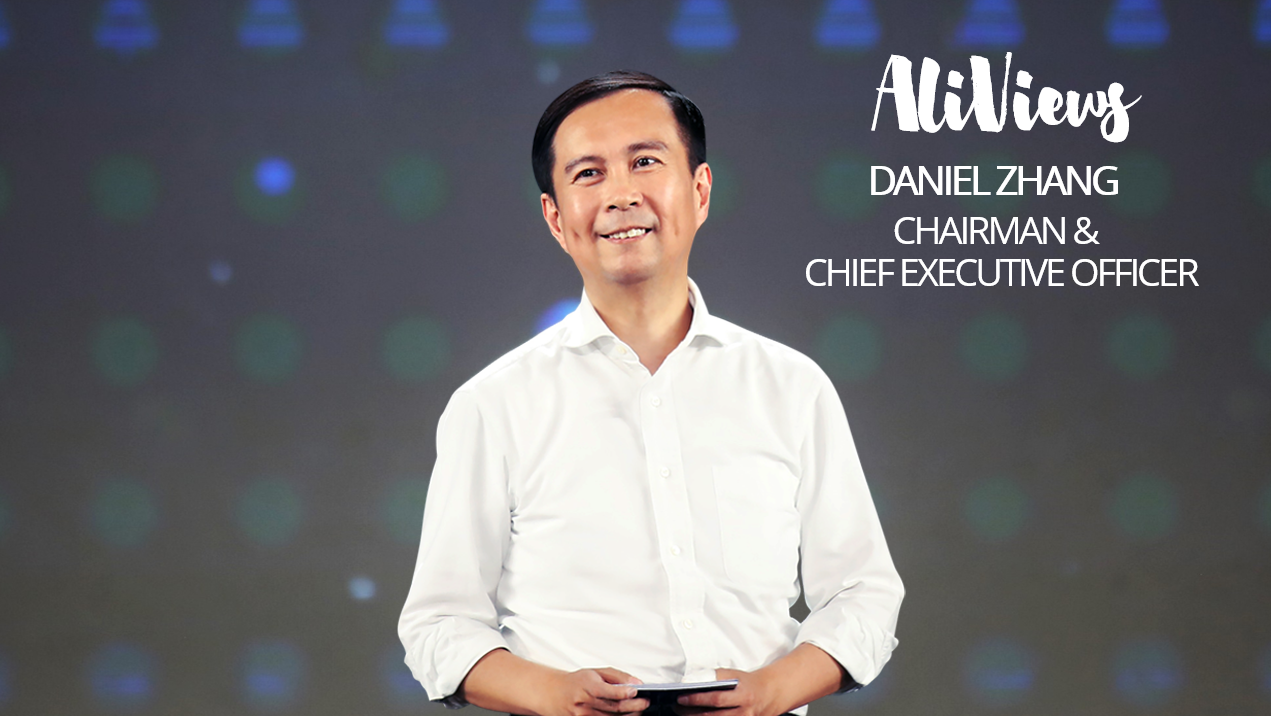
Alibaba Group on Thursday reported earnings for the quarter and fiscal year ended March 31, 2021. Shortly after, Alibaba Chairman and CEO Daniel Zhang addressed investors on a conference call. Below are his comments.
We delivered another solid quarter, marking a strong finish to this eventful fiscal year. China started the past year with the national battle against the Covid-19 outbreak and ended the year as the first country in the world to effectively control the pandemic and return to normal life. Based on the International Monetary Fund’s estimates, China was the only major economy that achieved positive real GDP growth in 2020. According to the National Bureau of Statistics, China recorded retail sales of RMB42 trillion (US$6.4 trillion) during the 12-month period ended March 31, 2021, and GDP growth in the quarter ended March 2021 reached 18.3% year over year. Against the backdrop of this macroeconomic recovery and accelerated digitalization in China, Alibaba Group achieved healthy growth across all businesses.
During the past fiscal year, we made significant progress on our three key strategies, namely domestic consumption, globalization and cloud computing. Such progress demonstrated the tremendous power of Alibaba’s digital commerce infrastructure as well as our long-term commitment to invest for the future and to create value for our consumers, merchants and partners through innovations. For our consumer-facing businesses, Alibaba Ecosystem recorded GMV of RMB8.1 trillion during the fiscal year, a net increase of over RMB1 trillion year over year. Annual active consumers for our ecosystem reached a historic milestone of over 1 billion, with a net increase of 170 million year over year. Our annual active consumers outside of China increased by 60 million to over 240 million as of March 2021, which reflected the progress of our globalization strategy. Benefiting from the increasing demand for digitalization across industries, Alibaba Cloud’s revenue exceeded RMB60 billion for the past fiscal year, representing a year-over-year growth of 50%, as it continued to strengthen its market leadership in China and Asia Pacific.
During the past fiscal year, we have gone through all kinds of challenges, including the Covid-19 pandemic, fierce competition as well as an anti-monopoly investigation and penalty decision by Chinese regulators. We believe the best way to overcome these challenges is to look forward and invest for the long term, to create value for our customers through technology and innovation and to solve major problems in society. Therefore, we plan to invest all of our incremental profits this year into core strategic areas, such as technology innovation, support programs for merchants to lower their operating costs, user acquisition and experience enhancement, merchandising and supply chain capabilities, infrastructure development and new business initiatives. Considering that our incremental profits are expected to be significant, our investments will be highly targeted and disciplined. They will be designed to enlarge our total addressable market, differentiate consumer and merchant value propositions from our competitors, and generate greater consumer engagement and purchase frequency. We will establish key metrics to measure the effectiveness of these investments, which we believe will generate significant results in the long term.
Our annual active consumers in China reached 891 million by the end of March. We hope to grow that consumer base in China by over 100 million in the coming fiscal year to reach over 1 billion. Annual active consumers for our China retail marketplaces were 811 million by the end of March, representing a net increase of 85 million year over year. These consumers spent an average of RMB9,200 annually per person. We believe this is the largest and best-quality consumer base in China. We will continue to serve the demands of consumers’ diversified lifestyles based on their segmented preferences.
As the largest digital consumption marketplace in China, the Taobao app will continue to strengthen its comprehensive supply of branded products, value-for-money products, agricultural products, imported products and differentiated long-tail products to meet the diversified demands of our consumers. In underpenetrated categories, such as grocery, real estate, home furnishing and pharmaceuticals, we will redefine the consumer journey and digitalized experience for the sector to enhance its online and New Retail penetration. We will also work on improving the overall consumer experience and engagement in the Taobao app by offering diversified consumer journeys based on different user segmentation and intent. At the same time, we are improving the tools and enabling capabilities for merchants to enhance their customer engagement and are reviewing our platform policies to lower their operating costs.
As part of our China retail marketplaces, Taobao Deals has grown rapidly over the past year, reaching over 150 million annual active consumers. As an indication of the activeness of our app users, monthly active users of Taobao Deals reached 130 million in March, a net increase of 27 million from December. Taobao Deals offers the best value-for-money products for price-conscious consumers. It features simple product design and direct-to-consumer supply from farms and manufacturers. The rapid growth of Taobao Deals contributed positively to our China retail marketplaces. During the past fiscal year, average spending of consumers who purchased on Taobao Deals increased more than the average spending of all China retail marketplaces consumers. We will further increase our investment in Taobao Deals in the new fiscal year to serve more price-conscious consumers in less-developed areas.
Next, I would like to talk about New Retail, which includes the community marketplace model that has attracted a lot of attention lately. Alibaba introduced its New Retail strategy in 2016 and we have executed our strategy based on multiple business models to serve the various demands of consumers. For grocery, fresh produce and FMCG products, we transformed offline retailers such as Sun Art through digitizing their operations and created New Retail formats, such as Freshippo, that integrate online and offline experience. The combination of these New Retail formats satisfy consumer demands not only in-store but also in nearby communities by offering comprehensive delivery options such as one hour, half day, same day and next day.
As part of our latest exploration in New Retail, we started the community marketplace business in select regions in China. Our Community Marketplace is supported by the supply chain capabilities of Freshippo, Sun Art and other partners. In addition to the one-hour, half-day, same-day and next-day delivery options mentioned above, we now offer community consumers with the option of “order today and pick up tomorrow.” We believe New Retail is a multi-format commerce infrastructure, of which the community marketplace model is one of the essential ways to serve price-conscious consumers. This model can help us acquire new users in lower-tier cities and rural areas and further increase our users’ consumption frequency and stickiness.
We believe the key to unlocking the full value of the community marketplace model is not only about the standalone P&L of the business but also about the overall efficiency and servicing capabilities of the entire commerce platform where the business sits, and we believe the latter can generate far greater value than the former. Alibaba has the most sophisticated and efficient commerce infrastructure in China, with the most comprehensive product and service offerings to serve consumers of diverse segmentation and demands. Accordingly, we believe we will be able to create and capture the highest customer lifetime value through investments into the community marketplace business. We will grow this business by leveraging Alibaba Ecosystem’s four core capabilities, including merchandising and supply chain capabilities, logistics and fulfillment infrastructure, consumer engagement capabilities, and distribution channel development and management capabilities. While we are still in the early stage of business expansion, our goal for the new fiscal year is to expand our geographic coverage nationwide and define a healthy and sustainable community marketplace business model.
Cainiao Network has delivered solid revenue growth during this fiscal year. Revenue from external customers outside of Alibaba Group grew 68% year over year and contributed to over 70% of Cainiao Network’s total revenues. Cainiao also reached an important milestone of generating positive operating cash flow during the year. We believe Cainiao’s continuous growth will be driven by three important engines: 1) first-mile business based on Cainiao Post and Cainiao Guoguo, 2) fulfillment services from factory to consumers, and 3) cross-border supply chain services for importing and exporting merchants.
Building on top of the significant improvement in operating efficiency in the last few quarters, Ele.me invested in user acquisition and logistics capacity during the Chinese New Year period, when many residents were encouraged by the local government to stay in the same city they work and avoid long-distance travel due to the pandemic. As a result, Ele.me’s annual active consumers grew strongly at close to 20% year over year during the fiscal year while user experience improved. Looking forward, we will continue to invest in Ele.me’s consumer mindshare as the entry point for local services through converting more of consumers in the Alibaba Ecosystem into Ele.me users as well as cross-selling between food delivery and other on-demand services to increase order frequency.
In our international commerce retail business, Lazada and AliExpress each achieved more than 100 million annual active consumers by March 2021. Lazada delivered another quarter with triple-digit order growth year over year. AliExpress continued to achieve rapid growth by significantly improving the logistics experience for its consumers leveraging Cainiao Network’s global smart logistics infrastructure. For example, France and Spain – two of the key markets where AliExpress invested in logistics infrastructure improvement – recorded triple-digit GMV growth year over year during the quarter. In the future, we will continue to invest in key cross-border logistics hubs in Europe, develop local logistics networks in target markets, and strengthen infrastructure support for our cross-border and local e-commerce businesses.
In fiscal year 2021, our cloud computing revenue grew 50% year over year to reach over RMB60 billion. I am very excited about the massive potential of our cloud computing business, as the post-pandemic world is facing a massive opportunity for industrial digitization. Cloud infrastructure will eventually replace IT infrastructure, empowering enterprises to achieve digital operations. As China’s industrial sector undergoes this digital transformation, manufacturers are moving toward smart manufacturing and direct-to-consumer initiatives while other traditional industries, such as retail, energy, finance and transportation, have all noticed the tremendous value and new opportunities that big data and intelligent applications could create. Alibaba Cloud will capture the historic opportunity by 1) investing in core IAAS and PAAS products (such as database, storage, elastic computing and big data platforms) to establish our core product competencies benchmarking against the global cloud leaders and 2) further expanding the integration of artificial intelligence with cloud infrastructure to provide our customers with more diversified industry intelligence solutions together with our partners.
Lastly, we announced in April 2021 that we received the Administrative Penalty Decision issued by the China’s State Administration for Market Regulation. We have stated that we accept the penalty with sincerity and will ensure our compliance with determination. As a result of the anti-monopoly fine of RMB18.2 billion levied by the SAMR, we recorded an operating loss this quarter for the first time since our history as a public company. The penalty decision motivated us to reflect on the relationship between a platform economy and society as well as our social responsibilities and commitments. We believe the self-reflection and adjustment we’ve made will help us better serve our community of consumers, merchants and partners and position us well in the future.
Sign up for our newsletter to receive the latest Alibaba updates in your inbox every week.




